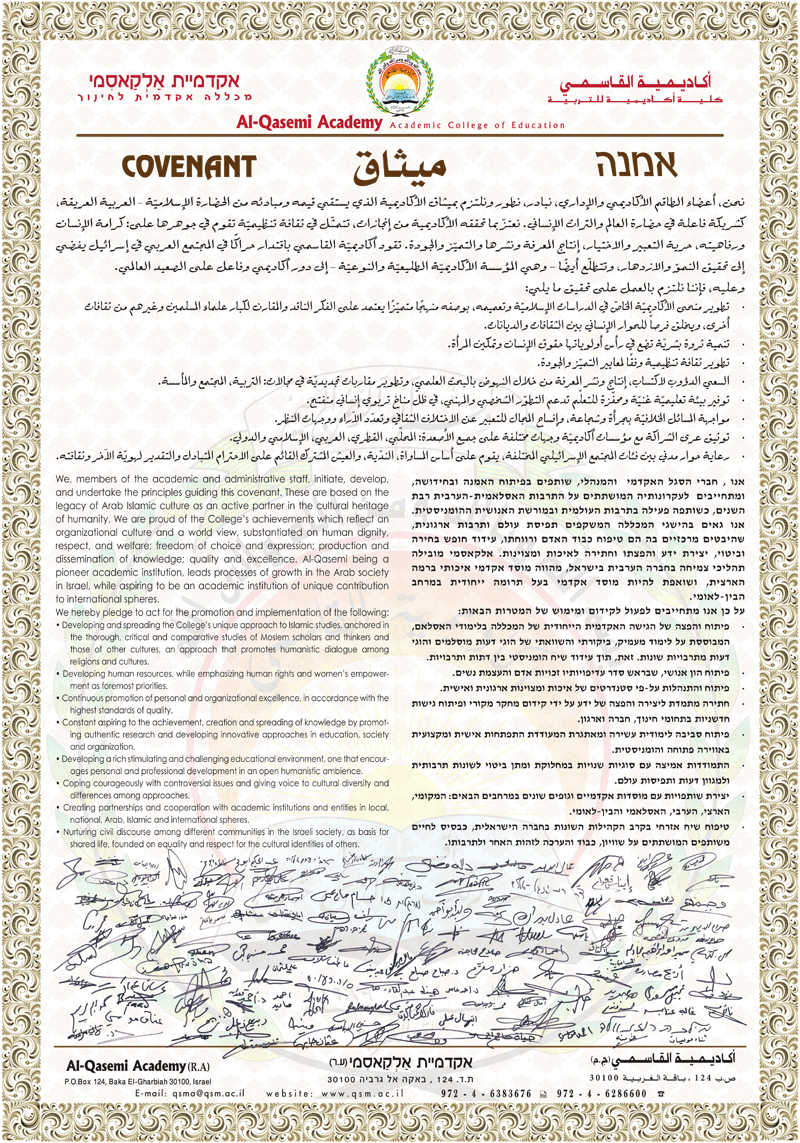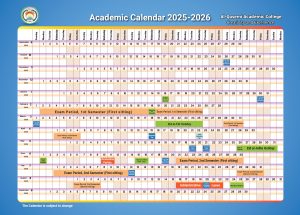
Al – Qasemi College vision is to create an academic environment that facilitates and foster both, the high quality of intellectual achievements, and a culture of dialogue between religions, cultures, and traditions.
On the academic and educational spheres, one of the College’s goals is to develop the human resource capabilities in the Arab community by training high – qualified teachers, who will deal with the complicated challenges that societies face!
The college sees within the teachers’ training process and their professional development the mechanism that will enhance the educational system; causing by its turn important changes within additional social domains. Al – Qasemi is actively working to create a new model for higher education, in addition to other achievements alike, throughout the following activities:
- Partnerships with other academic institutions within Israel and outside the country.
- Professional conferences and study days.
- Research corporation of the diverse faculties within the college and abroad.
Al – Qasemi College, the first Arab Academy for Higher Education in Israel, is a source of pride for the Arab minority in the country.
QSM Academic Calendar 2025-2026:
History
Al-Qasemi Academic College of Education is regarded as a prominent and leading institution of teacher education. Al-Qasemi was primarily established in 1989 as an institution for Islamic studies. In 2002, the college was accredited by the Council of Higher Education in Israel to award a B.Ed. degree in different fields. In 2010, the college was granted the right to award the M.Ed. degree, followed by M. Teach degree in 2017 .
Al-Qasemi has a culture of research and technology which is committed to the dissemination of scientific and educational knowledge, and the sustainability of academic excellence and innovation to better serve its students, faculty members, as well as the global community.
Al-Qasemi has succeeded in paving its way and locating itself among the national leading institutions of higher education due to the high quality of academic education, and the devotion to the development of human potential.
The college programs include theories of teaching, research, and practice with special emphasis on leadership and innovation in the classroom. Furthermore, it believes in preparing and training highly qualified teachers who will be able to make a difference and contribute to the welfare of their communities.
The preparatory program is considered a golden opportunity for students who have not been fortunate enough to obtain the full Bagrut certificate or those who did not achieve the required Bagrut average for admission to the academy. The GPA obtained at the end of the preparatory program serves as a substitute for their previous Bagrut average. Generally, a high percentage of preparatory program students achieve GPAs that qualify them for admission to various academic subjects. Therefore, this program is the first step towards achieving the academic dream for this group of students.
Covenant
 We, members of the academic and administrative staff, initiate, develop, and undertake the principles guiding this covenant. These are based on the legacy of Arab Islamic culture as an active partner in the cultural heritage of humanity. We are proud of the College’s achievements which reflect an organizational culture and a world view, substantiated on the dignity of humans; their respect and welfare; freedom of choice and expression; the production and dissemination of knowledge; quality and excellence. Al-Qasemi Academy, being a pioneer academic institution, leads processes of growth in the Arab society in Israel, while aspiring to be an academic institution of unique contribution to international spheres.
We, members of the academic and administrative staff, initiate, develop, and undertake the principles guiding this covenant. These are based on the legacy of Arab Islamic culture as an active partner in the cultural heritage of humanity. We are proud of the College’s achievements which reflect an organizational culture and a world view, substantiated on the dignity of humans; their respect and welfare; freedom of choice and expression; the production and dissemination of knowledge; quality and excellence. Al-Qasemi Academy, being a pioneer academic institution, leads processes of growth in the Arab society in Israel, while aspiring to be an academic institution of unique contribution to international spheres.We hereby pledge to act for the promotion and implementation of the following:
- Developing and spreading the College’s unique approach to Islamic studies, anchored in thorough, critical and comparative studies by Moslem and non Moslem scholars, an approach that promotes humanistic dialogue among religions and cultures.
- Developing human resources, while emphasizing human rights and women’s empowerment as foremost priorities.
- Continuous promotion of personal and organizational excellence, in accordance with quality standards.
- Constant aspiring to the achievement, creation and spreading of knowledge by promoting authentic research and developing innovative approaches in education, society and organization.
- Developing a rich stimulating, and challenging, educational environment, one that encourages personal and professional development in an open humanistic ambience.
- Coping courageously with controversial issues and giving voice to cultural diversity and differences among approaches.
- Creating partnerships and cooperation with academic institutions and entities in local, national, Arab, Islamic and international spheres.
- Nurturing civil dialogue among different communities in the Israeli society, as basis for shared life, founded on equality and respect for the cultural identities of others.

